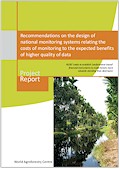| Report |
 |
|
| Title | Recommendations on the design of national monitoring systems relating the costs of monitoring to the expected benefits of higher quality of data | | Author | Meine van Noordwijk, Sonya Dewi, Betha Lusiana, Degi Harja, Fahmuddin Agus, Subekti Rahayu, Kurniatun Hairiah, Maswar, Valentina Robiglio, Glen Hyman, Douglas White, Peter A Minang, Lou Verchot and Vu Tan Phuong | | Year | 2012 | | Institution | World Agroforestry Centre - ICRAF, SEA Regional Office | | City | Bogor, Indonesia | | Report Number | Project Report | | Number of Pages | 42 | | Call Number | RP0290-13 |
|
| Abstract: |
| REDD+ seeks to establish 'performance based' financial
instruments to make forests more valuable standing than
destroyed. A trustable, reliable and transparent C accounting
system at national scale is thus essential. Accuracy of C stock and
emission estimates depends strongly on scale: approaches that
are sufficient for reliable national accounting may not be
accurate at site ('pixel') level. The proposed REDD
implementation mechanisms thus influence the required levels of precision at specific
scales, and the benefits that stakeholders can obtain from investment in better data.
Within a general scheme of the type of tree, forest, soil and land management
practices that are needed to estimate emissions, we review a number of datasets to
assess sources of bias and random error, linked to the level of replication that is needed
to achieve specified precision. We also summarize data on costs of data collection at a
number of scales, with different levels of precision. In combination, the costs and
benefits of investment in data quality can be weighed and a balance achieved between
achievement and 'transaction costs' (to which the costs of designing a monitoring
system contribute). To be cost effective, national monitoring systems can build on
existing forest inventory and soil data, but they need to be analyzed for bias
components and variability to assess adequacy for carbon stock appraisals. Examples
for Indonesia are given of the gap between these data and intensive ecological studies:
reconciliation of the data sources requires reanalysis of the site selection for ecological
studies and of pre-1990 logging across the country. We provide a list of 10
recommendations and summarize the current situation in Indonesia, Vietnam,
Cameroon and Peru relative to these suggestions that combine biophysical and
institutional dimensions of system design. |
|
|
Download file(s): Click icon to download/open file.
|
| |
File Size |
Description |

|
1,255 KB |
Softcopy |
|
|
|
| Viewed in 2361 times. Downloaded in 498 times. |